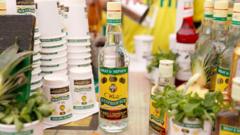A heated debate over the definition of "Jamaican rum" has emerged in the Caribbean as industry stakeholders grapple with recent legal changes aimed at protecting the product's heritage.
Dispute Over What Defines Jamaican Rum Deepens

Dispute Over What Defines Jamaican Rum Deepens
The integrity of Jamaica's rum industry is at stake as producers clash over geographical indication regulations.
Rum has long been an important facet of Jamaica's cultural landscape, but a significant dispute has arisen regarding what standards must be met for a product to be labeled as "Jamaican rum." This controversy ignited after the Jamaica Intellectual Property Office (JIPO) introduced amendments to the geographical indication (GI) designation, which originally came into effect in 2016. The primary modification prohibits rum that is aged outside of Jamaica, a change championed by the Spirits Pool Association (SPA).
The SPA, representing six leading Jamaican distilleries—including Appleton and Hampden Estate—argues that a robust GI is essential for authenticating Jamaican rum in vital international markets such as the EU and the US. Advocates believe that enhanced protection will bolster the recognition of Jamaican rum as a premium product and safeguard it from various competitors.
However, this amendment has triggered backlash from the National Rums of Jamaica (NRJ), one of the island's largest producers, responsible for a significant share of local rum production through its ownership of brands like Long Pond and Clarendon. Since being acquired by the French firm Maison Ferrand in 2017, NRJ's business model has relied heavily on aging rums overseas—an approach now adverse to the new GI regulations. They contend that rum aged abroad still deserves the Jamaican label, arguing that this has been traditional practice for centuries.
NRJ is currently appealing the JIPO's ruling, with a critical hearing set for April 28. The SPA's general manager, Christopher Gentles, expressed confusion regarding NRJ's objections, emphasizing that true Jamaican rum should be aged on the island itself, which is fundamental to its authenticity.
The debate resonates beyond Jamaica, as neighboring Barbados also faces challenges concerning GI regulations for its rum industry. Barbados has yet to introduce a GI plan, leading many local distilleries to work towards establishing guidelines that would protect their products similarly to Jamaican rum.
Experts, such as Professor Dev Gangjee from Oxford University, underline the significant benefits that proper GIs can provide: price premiums, anchoring regional production, and enhanced advertising potential for the locale.
For the SPA, achieving a robust GI is as much about pride and heritage as it is about economics, ensuring that Jamaica's rich history in rum production is accurately reflected and protected against dilution by foreign interests. As the legal battle unfolds, stakeholders remain hopeful that a compromise can be reached that honors the integrity of Jamaican rum while catering to the future of the industry.



